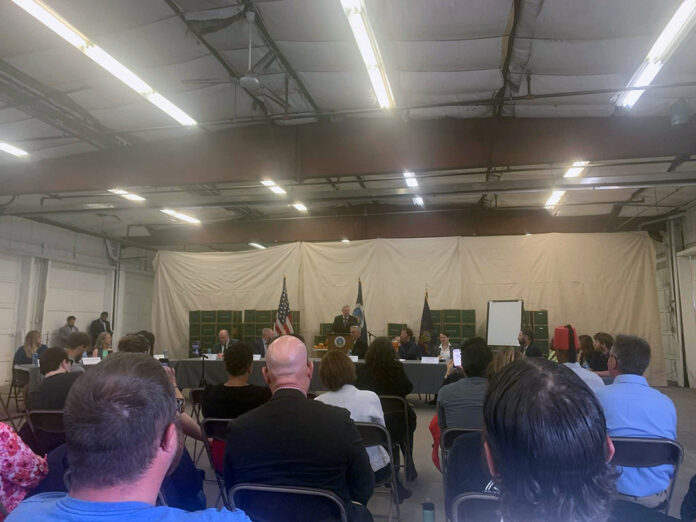
PITTSBURGH — Lisa Freeman lives in a food desert and opened her business, Freeman Family Farm and Greenhouse, in Pittsburgh’s Manchester neighborhood, to give her community access to fresh foods when there were no other options.
However, she has faced many challenges trying to get her business off the ground despite help from grant programs.
“I’m about $100,000 short in completing my (zoning codes) and now I have to work that much harder, write so many more grants and kiss the golden ring of anybody who puts their fingers out at me to be able to assure that we can cross the finish line,” Freeman said.
Freeman was among a group of panelists, which included Secretary of Agriculture Tom Vilsack and Pennsylvania Department of Agriculture Secretary Russell Redding, who spoke to a small crowd of people on Sept. 21 in Pittsburgh to discuss funding opportunities to connect and improve local food systems.
The USDA’s latest programs seek to bridge this gap by connecting farmers to local food networks intended to give farmers better wage opportunities and communities affordable, fresh food. Despite these grants and programs, however, others still find it difficult to get the help they need.
Urban farms still struggle
Freeman first started Freeman Family Farms and Greenhouse as a school and community garden in 2011. Since then, her business has expanded to help alleviate food insecurity in the area, teach neighbors how to garden and provide a work release program for incarcerated men. Now, she hopes to open up a grocery store where residents can buy locally sourced-food.
She lives in a community that is designated by the USDA as a food desert, which is a low-income community with low or no access to healthy and affordable food via supermarkets in a one-half-mile radius.
Attempts to reach these communities are being made by the USDA, but it’s unclear if there are any measurable results. Freeman said she knows of a commercial kitchen in her community that received a sizable USDA grant in part because it’s located in a food desert with a low-income and minority population.
She said the business opened with the goal of providing opportunities to minority entrepreneurs, but she claims this hasn’t happened. She added that residents are unable to use the kitchen’s services because prices are too high for low-income residents to utilize.
“That is what really got me because they get priority over everyone else under the guise that I’m thinking they’re serving that community and bettering that community,” Freeman said.
Freeman believes if a company is going to be given priority for being in a low-income area, they should at least have to show their results. For Freeman Farms to be able to receive state and federal grants, she has to send in receipts, pictures and sometimes even outcome measurements.
Freeman also talked about the lack of opportunity for urban farmers to receive grants from the USDA’s Farm Service Agency. She said there are a lot of opportunities for rural farmers to receive grants and subsidies but don’t make it feasible for urban farmers to receive loans.
“We don’t grow enough. We’re not on acres, we’ve not on rolling hills, we don’t have cows, meat animals,” Freeman said. “It would be infeasible to take a loan out because we could never repay.”
Grant programs benefit ag jobs and schools
Panelist Ben Buchanan founded his company Unified Fields Inc. in 2020 during a time when the meat industry was falling off. His company seeks to support locally sourced meat and train individuals interested in the meat processing industry.
He said federal programs have helped him expand his markets and made it possible for him to distribute products to the city.
Buchanan said a big concern of his has been labor shortages in the agricultural and meat industry. He also teaches butchery through Community Kitchen Pittsburgh, a Hazelwood-based non-profit that offers an intensive culinary arts training and employment program for people with barriers to employment.
Last year, Community Kitchen Pittsburgh received a $184,500 Meat and Poultry Inspection Readiness Grant to expand its meat processing facility to beef up its butchery training program. Buchanan told Farm and Dairy that Community Kitchen also recently received another grant to start a butcher apprenticeship program.
According to Vilsack, the Meat and Poultry Processing Expansion Program also has a workforce component that is set to help train more individuals to work in the butcher industry.
“We spent about $40 million with a number of different colleges (and) technical schools to create the next generation of folks who will be able to work in those industries,” Vilsack said in an interview with Farm and Dairy. “We are working collaboratively on a workforce development side.”
Other panelists at the event expressed their gratitude for programs like the Farm to School Grant Program which has helped connect schools to local farmers and producers.
The Farm to School Grant Program provides funding to schools to improve their access to healthy, local foods and increase farm and agriculture education. The main aim is to connect local food systems, something that Buchanan’s Unified Fields Inc. has been able to work toward through USDA grant programs.
Alongside improving local food systems and aiding schools, Vilsack adds farmers’ benefit too with the addition of a new market and revenue stream.
“I would say the Farm to School program is tremendous. We’ve seen a lot of farmers understand and appreciate that they can make a living by just simply producing for school districts,” Vilsack said.
Moving forward, Vilsack notes there are a number of things that should be addressed when it comes to the next Pennsylvania Farm Bill, but most importantly, it should continue to protect and enhance local food systems and farms.
(Reporter Liz Partsch can be reached at epartsch@farmanddairy.com and 330-337-3419.)









